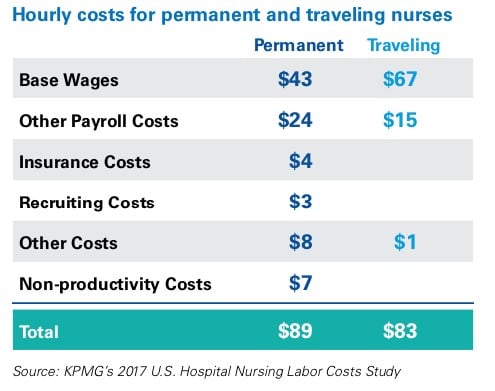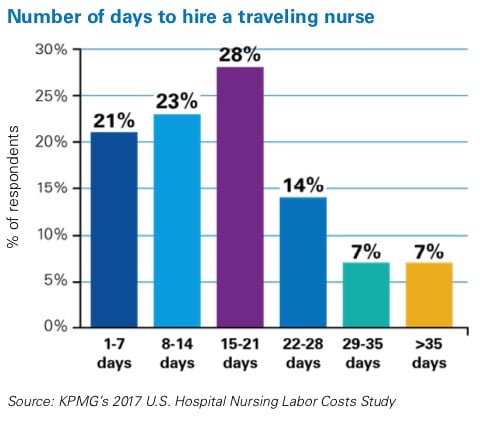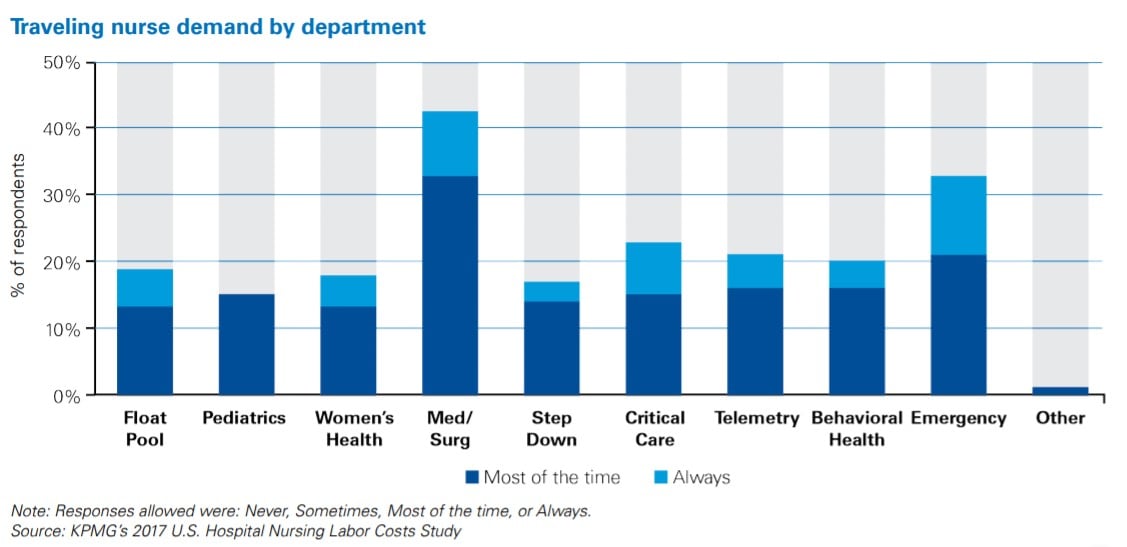
Traveling Nurses Cost Less than Staff Nurses: KPMG Study
When all nursing labor costs are considered, traveling nurses seem to cost less than permanent nurses on an hourly basis, according to the KPMG U.S. Hospital Nursing Labor Costs Study. The study, which surveyed 100 senior executives from hospitals across the country, looked at cost data provided by hospitals for a full-time, permanent nurse and calculated the hourly wage to be approximately $89 per hour. For traveling nurses, the cost is about $83 per hour.
Other key findings show that traveling nurses:
- Are in high demand
- Represent approximately 11% of respondents’ nursing staffing
- Demand will continue to grow in numbers and percentage of nurses overall
For hospitals considering, maintaining, or even increasing their travel nurse staffing, the study shares key findings and trends that reveal the impact traveling nurses are making on an industry challenged by a nurse labor shortage.
Uncovering Labor Costs
As the economy continues to improve, so does the demand for wages and nurses. For hospital executives, these conditions deepen the challenge of how best to allocate scarce resources and optimize hospital staffing to reduce labor costs and improve patient care and safety. Therefore, uncovering costs and then where to cut them are key priorities.
The study showed that the hourly wage of permanent nurses is likely higher than traveling nurses by approximately $6 per hour. But digging a little deeper, the study pointed out that base wages alone are a poor measuring stick to uncovering costs.
“Although a permanent, full-time nurse typically has a base wage that is lower than a traveling nurse’s bill rate, fully loaded payroll costs (base wages and other payroll costs) for a permanent nurse represent 76 percent of the all-in cost,” the study said. “This is in contrast to traveling nurses at ~98% of all-in costs represented by payroll costs.”

Other hidden costs when comparing permanent and traveling nurses include non-productivity for permanent nurses, which includes continuing education and administrative tasks, along with attrition and their hiring timeline.
“Considering that it may take several weeks or months to recruit a permanent nurse before the nurse is trained, traveling nurses may provide a quick and cost-effective means to provide quality care to patients of the hospital without having to wait months for a vacancy to be filled,” the study said.

Travel Nurses Are in High Demand
According to the study, the nursing shortage is the main reason for using traveling nurses in hospitals, with permanent nurse attrition named as a key contributor to the shortage. Study respondents named the following top reasons why they use traveling nurses:
- Local nursing shortages
- Facility growth
- The cost goes to the different departmental line item
- Flexibility
- Seasonal needs
- EMR/special projects
Respondents said that their hospitals expected to increase the number of traveling nurses used at their facilities by about 8% in the coming year. The survey found that even though respondents thought that the ideal mix of traveling nurses in the total nurse population should be about 6%, the study showed that the current percentage is about 11%.
“Given the positive growth rate in expected traveling nurse usage, it appears that hospitals may remain above their ideal traveling nurse percentage in the coming year,” the study said.
Respondents said the primary quality they look for in traveling nurses is the ability to provide the highest quality of care. In addition, they also consider cost, experience, flexibility, specialty, and time to hire.
The survey also revealed that respondents hire the majority of their traveling nurses for medical-surgical and emergency room departments, but concluded that there does not appear to be a department in their hospitals in which traveling nurses are not in demand.

